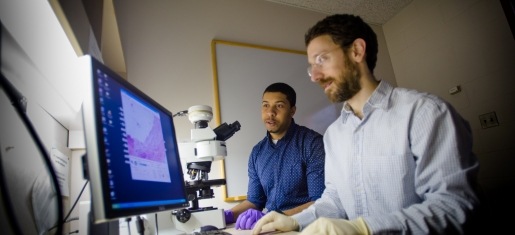The graduate programs in biomedical engineering at Michigan Tech provide a research-intensive education integrating the engineering sciences with biomedical science and clinical practice.
Join a Thriving Research Program
Work with faculty who put students first. Our faculty have a strong track record of securing funding from organizations such as the National Institutes of Health, the National Science Foundation, and the Department of Defense.
The department's active research thrust areas include
- Tissue engineering and biomaterials
- Biosensors and biomedical instrumentation
- Biomedical optics and ultrasound
- Cardiovascular engineering
- Microdevices
- Biomimetics and bioadhesives
- Biomechanics
Your research activities will advance knowledge along the front lines of biomedicine, contributing to scientific breakthroughs that enhance health care—and ultimately save lives.
You will be able to participate in a wide array of cutting-edge research projects. Design simple, natural, injectable, drug-releasing hydrogel blends for tissue regeneration and repair. Develop and fabricate biosensors for medical diagnostic and biotoxin detection. Improve the safety and efficacy of tissue and blood-contacting devices through the development of materials that impart controlled nitric oxide release ability to implanted medical devices.
Modern lab facilities are equipped to accommodate research in each faculty member's respective area of focus.
Connect with Medical Industry
The department has partnerships with industry and local health organizations including Portage Health, Marquette General Hospital, and the Upper Peninsula Health Education Corporation. We are an active member of Medical Alley, an organization of Midwestern medical industry leaders.
These relationships afford students the direct opportunity to explore health care applications of biomedical engineering, or to design a small business from the novel technologies developed through their research.
The doctoral program prepares students to succeed in postdoctoral research positions or academia, and both the doctoral and master's programs offer pathways to research and development careers in industry or governmental labs.
MS Options
Masters Program Handbook| Printable
Whether your interests lie in research or course work, we offer a master's degree option to suit your educational goals.
NOTE: The graduate school allows a 12 credit maximum in 3000-4000 level courses for Masters degrees, however the Biomedical Engineering Department allows only a 9 credit maximum for 4000 level courses for all Masters Degrees.
PhD Plan
PhD Program Handbook | Printable
A detailed explanation of degree requirements can be found on the Graduate School's Doctor of Philosophy requirements page.
This website is not the official policy, details are subject to change. Please check with the department for the most current and accurate policy.
